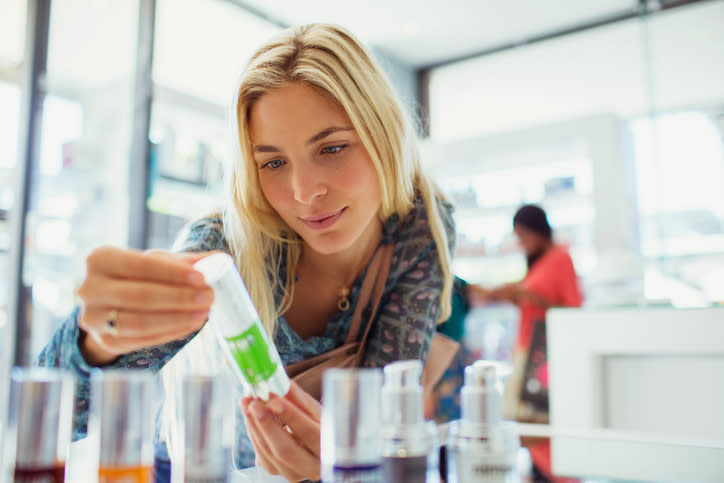Are essential oils bad for your skin? These findings may surprise you
When you think of the term ~essential oils~, the phrases “blissful relaxation” and “spa day” probably come to mind. You may envision a dark, candlelit room with the smooth scents of lavender and peppermint oil wafting through the air. At the very least, you probably think of one of those pocket-sized tubes of migraine support 0ils that promise to dull an acute headache with a few dabs to the wrists and temples.
The general consensus here? Most would equate essential oils as a holistic and healthy addition to your life. But how good are essential oils really for your skin? They’re not regulated by the Food and Drug Association, and a great deal of the information put out about them comes directly from the multilevel marketing companies that sell them on Instagram and Facebook. As such, we’re taking a deeper dive to see what this essential oils business is all about and if, in fact, they’re good for your skin.
Let’s cover the basics.
Essential oils are those extracted from plants and then distilled at highly concentrated levels, according to the Mayo Clinic. Oh, and another thing: there’s nothing essential to your life about them. The “essential” part of the name comes from the fact that they are the concentrated essences of a plant, the Los Angeles Times reports.
They are often synonymous with aromatherapy. The use of essential oils for therapeutic purposes like stress, anxiety, or depression relief, and also for the alleviation of pain for chronic syndromes like migraine headaches and insomnia, is very common.
Here’s how it works.
If you’re thinking most essential oils are used as bath salts, massage oils, or lotions, then you’d be right. Most uses include slathering some peppermint oil on your neck for a tingling effect or hopping into a hot lavender bath for a long rejuvenating soak. (Which, now that we’re talking about it, sounds like something we’d like to be doing right now…)
“Aromatherapy is thought to work by stimulating smell receptors in the nose, which then send messages through the nervous system to the limbic system — the part of the brain that controls emotions,” the Mayo Clinic reports.
Now, that seems simple enough: take a deep whiff of said essential oil, let it work its magic in your brain, and enjoy the feeling of total and blissful relaxation that ensues. Except, where does that leave the effect the essential oils on the site of application? As highly concentrated forms of oil — oil not regulated by the FDA — the oils can sometimes be too intense when they come in contact with the skin.
Smell something burning?
“When [essential] oils are applied to the skin, side effects may include allergic reactions, skin irritation, and sun sensitivity,” the Mayo Clinic reports, additionally noting that there is not enough substantial research to understand how essential oils may affect children, women who are pregnant or breastfeeding, or those on certain medications. (Please, DO NOT use essential oils on children ages 6 or younger.)
To put this in perspective, it’s important to note the purity and concentration of the oils. Like snowflakes, no two essential oils are exactly alike, meaning different concentrations can produce drastically different effects.
“Some oils are considered safe if inhaled, and yet may be irritating if applied to the skin in concentrations as low as three to five percent. Thyme, oregano, clove, and cinnamon bark essential oils are examples of this,” a University of Minnesota report advises. “Several of the citrus oils, such as bergamot, lemon, lime, orange, and angelica, can cause phototoxicity (severe burns or skin cancer) if there is exposure to natural sunlight or sunbed radiation following skin applications.”
Without getting into the nitty-gritty, phototoxicity = not pretty. The use of undiluted essential oils directly on the skin can conjure up some other gnarly skin conditions, ranging from rashes to permanent loss of skin pigmentation.
“Risks vary depending on age of the individual, the manner in which they are using the oils, their personal health history, medications taken, and their personal body chemistry,” Katharine Koeppen, a registered aromatherapist and owner of Aromaceuticals in Dallas, Texas, tells Woman’s Day.
Too much of certain essential oils used unchecked can also be damaging to the liver and contribute to the growth of tumors. Of course, this does not happen with all essential oils. The important things to remember here are concentration and dosage of the oil. Just adopt the less-is-more mentality.
Essential oils in skin care.
Many cosmetic brands stay far away from skin care that lists essential oils as ingredients.
Paula’s Choice, a sort of online beauty encyclopedia, lists essential oils as a huge irritant, one that you should avoid at all costs. A lot of faux organic skin care lines, maybe ones you’ve seen at your local farmer’s market, might brag that they are made purely of essential oils, but we wouldn’t swap out traditional moisturizer for essential oils just yet.
All things considered…
All in all, essential oils are NOT pure evil. If the scent of lavender helps you fall asleep, mix some lavender essential oil with water and spritz around your bedroom. As long as you aren’t covering your face in oil, or you’re washing your body after an aromatherapy massage, we don’t see the harm.




